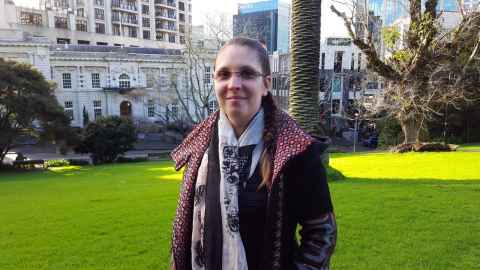Take 10 with... Marie Graff
Dr Marie Graff from the Department of Mathematics gives us 10 minutes of her time to discuss her work developing algorithms for imaging in fields such as ultrasound or seismic exploration.

1. Describe your research topic to us in 10 words or less.
Inverse scattering problems.
2. Now describe it in everyday terms!
'Inverse scattering problems' is mathematical jargon to describe my research - developing algorithms for imaging in fields such as ultrasound or seismic exploration.
Typically, to perform imaging, a signal is sent in the medium (the human body, the Earth's interior, etc.) and reflections of this signal are recorded. The aim of imaging is to convert the recorded signal (the pressure or electromagnetic wave) into the physical properties we wish to observe. For example, it allows us to detect tumours (medical applications) or deposits (geophysics).
The main challenge is that such a problem is extremely sensitive and can easily become unstable. It may result in producing an incorrect image of your medium. One of my research questions is to study regularisation techniques that allow us to stabilise the considered inverse problem. My research also aims to provide an optimal image at the highest possible resolution for the lowest possible cost, which is dictated by industry requirements (computational time, storage memory).
3. What are some of the day-to-day research activities you carry out?
As an applied mathematician, my day-to-day research activities switch between pen-and-paper analysis of the model and implementing the corresponding algorithm. This is done alongside reading papers to improve the model and looking for new advancements in the current literature.
However, since arriving in Auckland ten months ago, I have focused on supervising students and writing funding proposals. Hopefully, I can soon go back to doing my own research again! It is just taking a bit of time to settle and adjust to my new role as lecturer and independent researcher (and a young mum).
4. What do you enjoy most about your research?
I enjoy the nice images generated by the algorithm solving the inverse scattering problem. The images I obtain are indeed a useful tool to illustrate my methods in academic papers and at conferences. This is really satisfying to be able to explain my work through pictures that clearly complement my methodology. And showing pictures to illustrate imaging techniques seems very natural.
5. Tell us something that has surprised or amused you in the course of your research.
While working with geophysicists in seismic exploration, I have been surprised to see that they used the same sophisticated tools to produce very efficient codes. The only difference from my approach in applied maths is the vocabulary. I find it amazing that people can work on similar topics using the same concepts, but do not understand each other because they kind of speak another language. For instance, what I call an 'objective functional', can be called 'misfit function' in geophysics or 'likelihood' in statistics.
This translation issue initially appears to be a barrier to collaborations between people from different departments or schools. But once you get over that hurdle, it is really worth it!
6. How have you approached any challenges you’ve faced in your research?
I usually approach any challenges by sitting down in front a blank page to write down all the information I have on the problem - again. When I'm really stuck, I also try to find somebody with whom I can discuss it. This person is not necessarily an expert in my field, but just talking the problem through with them will often 'spark' an idea or a new direction I can explore.
I guess this strategy is common among many mathematicians, though.
7. What questions have emerged as a result?
As an early-career researcher, I need good organisational skills to be able to manage all my tasks and responsibilities. I'm sure that is also true for more experienced researchers. Anyway, I am really careful of how I set up my priorities, so I can have everything done on time and in the most efficient way.
8. What kind of impact do you hope your research will have?
I hope that my research can produce high-resolution imaging that will be of interest to other academic scientists, practitioners or industrialists. I have just been contacted by a company to work with them on an inverse scattering problem and I really hope this collaboration will be fruitful.
9. If you collaborate across the faculty or University, or even outside the University, who do you work with and how does it benefit your research?
My research questions are compatible with questions arising in Physics, Environment, Engineering, or maybe even Psychology.
I am looking forward to developing good working relationships with colleagues from these departments and schools. Such research collaborations will allow me to develop algorithms using data from real-life applications, for instance.
10. What one piece of advice would you give your younger, less experienced research self?
I am not sure that I am qualified to give advice to my younger self, as I've only been an independent researcher for ten months.
But like many of my peers, I have experienced 'imposter syndrome', a phenomenon in which an individual doubts their accomplishments. So I think it is important to trust what other researchers see in you, as they might be the best mirror of your worth. Building a network of people who believe in you is hard, but helps a lot to develop your career, your self-esteem and what great things you are capable of doing.